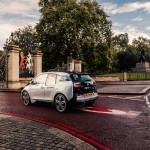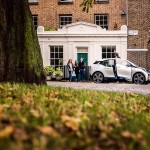The carsharing service DriveNow has added the electric BMW i3 to its fleet of available vehicles. DriveNow customers in London are now able to use the all-electric premium model by BMW i. This will be followed by the global roll-out of the BMW i3 in DriveNow vehicle pools during summer 2015 at several German locations and later in other European cities. With the addition of the BMW i3 to the DriveNow fleet, BMW i is aiming to promote electric mobility.
DriveNow customers in London now have access to 30 BMW i3s. Peter Schwarzenbauer, Executive Board member of the BMW AG explained,
“eCarsharing reduces traffic congestion and emissions in cities. I am pleased that with the BMW i3, we are now able to offer our DriveNow customers unique driving pleasure combined with easy access to electric mobility.”
DriveNow is an example of a carsharing scheme, which is often seen as an ideal complementary service to public transport, for times when a bus or train is not practical for a given journey.
Electric carsharing, such as the i3, is also seen as a means to reduce traffic and parking congestion and lower local emissions too since ownership of a car is not required. According to the Federal Carsharing Association, more than a million citizens in Germany already belong to the movement. According to company surveys, 38% of DriveNow customers have sold a personal vehicle as a result of using the carsharing scheme. Customers state that the most important reason for this is thanks to free floating carsharing, where they are able to use a car spontaneously if needed and also feel they are being adequately provided for by local public transport services.
Of course, as with all electric cars, the BMW i3 DriveNow cars benefit from being congestion charge free. Similar services and new perspectives have arisen from the promotion of locally emission-free mobility in urban areas. For example, the use of the electrically powered BMW ActiveE (a predecessor of the BMW i3) in DriveNow fleets in Munich, Berlin and San Francisco boosted interest in the experience of driving an all-electric vehicle. As a result, since March 2013, it has been possible to introduce the option of electric mobility to around 3,000 DriveNow customers in Germany each month, making a total of 100,000 customers.
The prerequisite for the success of eCarsharing programmes is the cooperation between providers and local authorities. The most crucial issue in this respect is the availability of public charging stations as well as privileged parking spaces for electric vehicles and carsharing fleets. This is of vital importance for flexible carsharing in particular. DriveNow maintains a permanent dialogue with municipal governments. User data on the electric BMW ActiveE, which has been deployed in Munich and Berlin since 2013, provide important information for the development of a requirement-oriented charging infrastructure.
With the introduction of the BMW i3 in London, DriveNow users will initially have access to approximately a dozen charging stations within the entire operative area. In Berlin, DriveNow customers already have more than 150 charging stations at their disposal for the BMW ActiveE. By the middle of 2016, a further 420 charging points will have been added, 20 of which are designed for DC quick-charging. A further 700 charging stations can be installed in succession if required. Currently, the Munich city council is adopting an initial decision in favour of supporting electric mobility, which also comprises the development of a public charging infrastructure. Moreover, the electrification of several streets in the city centre with the Light and Charge streetlamp produced by BMW i is planned for 2015.
In order to secure the success of electric mobility, BMW is pushing ahead together with partners from politics, the energy sector and the automotive industry, with charging infrastructure projects throughout Europe and the USA. These include a joint initiative with Volkswagen and ChargePoint for around 100 DC quick-charging stations in the USA, the project SLAM (quick-charging network for axes and large cities) for a total of 600 AC and DC quick-charging stations in Germany and the EU-funded initiative TEN-T for an infrastructure throughout Europe.
Source; BMW




